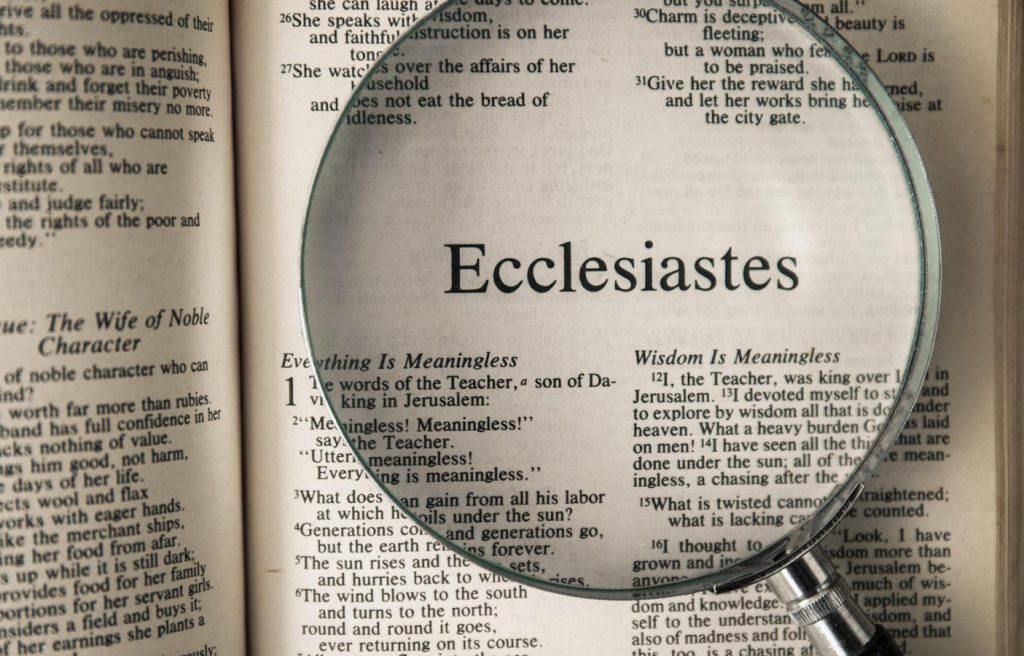
To listen to this reflection as a podcast, click here.
Throughout the month of August, we’re looking at Ecclesiastes, that strange and seemingly “modern” Old Testament book that depicts what happens when humanity searches for ultimate meaning apart from God.
“It was a dark and stormy night…”
That’s the opening line from the 1830 novel Paul Clifford by English writer Edward Bulwer-Lytton.
It is widely regarded as the worst opening line in the history of English literature, and has been endlessly parodied. Charlie Brown’s dog Snoopy, who was committed to writing the great American novel, began every one of his drafts with those seven words.
To be fair, here’s the entirety of Bulwer-Lytton’s first sentence: “It was a dark and stormy night; the rain fell in torrents – except at occasional intervals, when it was checked by a violent gust of wind which swept up the streets (for it is in London that our scene lies), rattling along the housetops, and fiercely agitating the scanty flame of the lamps that struggled against the darkness.”
Just awful.
So awful that it has inspired the annual Bulwer-Lytton Contest, sponsored by the English Department at San Jose State University, that challenges entrants to compose “the opening sentence to the worst of all possible novels.” The “best of the worst” entrants are annually recognized. John Farmer of Aurora, Colorado, won last year’s grand prize:
“I knew she was trouble the second she walked into my 24-hour deli, laundromat, and detective agency, and after dropping a load of unmentionables in one of the heavy-duty machines (a mistake that would soon turn deadly) she turned to me, asking for two things: find her missing husband and make her a salami on rye with spicy mustard, breaking into tears when I told her I couldn’t help—I was fresh out of salami.”
So bad it’s good.
Let’s go to the other end of the spectrum. What is the best of all opening lines?
It’s kind of hard to top Genesis 1:1, of course: “In the beginning God created the heavens and the earth.”
But if we’re looking at more recent literature, here are some much-loved openers:
“Life is difficult.” (M. Scott Peck, The Road Less Traveled)
“All happy families are alike. Each unhappy family is unhappy in its own way.” (Leo Tolstoy, Anna Karenina)
“The past is a foreign country. They do things differently there.” (L.P. Hartley, The Go-Between)
“It was the best of times, it was the worst of times.“ (Charles Dickens, A Tale of Two Cities)
“All children, except one, grow up.” (J.M. Barrie, Peter Pan)
“It is a truth universally acknowledged, that a single man in possession of a good fortune, must be in want of a wife.” (Jane Austen, Pride and Prejudice)
Those are the kinds of starters that have compelled millions of people to keep reading to see what comes next.
Then there’s the opening salvo of the Old Testament book of Ecclesiastes: “’Meaningless! Meaningless!’ says the Teacher. ‘Utterly meaningless! Everything is meaningless’” (1:2, New International Version).
That doesn’t sound much like a Bible text. It certainly doesn’t seem to align with “God loves you and has a wonderful plan for your life,” the first “law” of evangelist Bill Bright’s famous Four Spiritual Laws.
This is our initial clue that Ecclesiastes is not quite like anything else in Scripture. It is arguably the most misunderstood and maligned of all the Bible’s 66 books. Some commentators have described its tone as cynical and despairing. Rabbis spent centuries debating its inclusion in the Jewish Scriptures. Christian preachers have cast their votes for its importance primarily by ignoring it. It’s entirely possible to attend church services for 50 years and never hear a single sermon from a text in Ecclesiastes.
At the same time, Ecclesiastes is one of the most joyful books in the Bible. It identifies pleasure as one of God’s greatest gifts. The author unflinchingly declares, as he wraps things up, that nothing is more important than obeying God.
Ecclesiastes clearly deserves to be one of the five “wisdom” books of the Old Testament, which, taken together, constitute a whopping 15% of the Judeo-Christian Scriptures.
Therefore this oft-neglected gem will be front and center in our Morning Reflections throughout the month of August.
Going one paragraph at a time, we’ll explore what might be called the author’s Royal Experiment: Is it possible to have everything in the world – fame, power, love, money, wisdom, and influence – only to make the dreadful discovery that everything that’s part of the so-called Good Life adds up to exactly Nothing?
But first we need to address this question:
If God’s people have good reasons for believing that every moment is shot through with meaning, and that death itself cannot rob us of our life with God and each other, why is there a book in the Bible that begins by declaring that everything is meaningless?
That’s where we’ll begin tomorrow.
